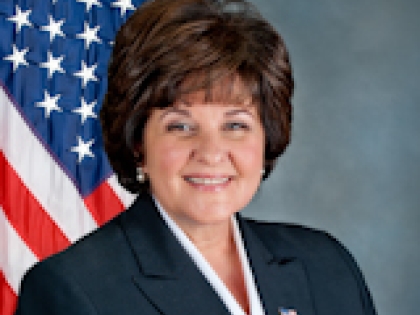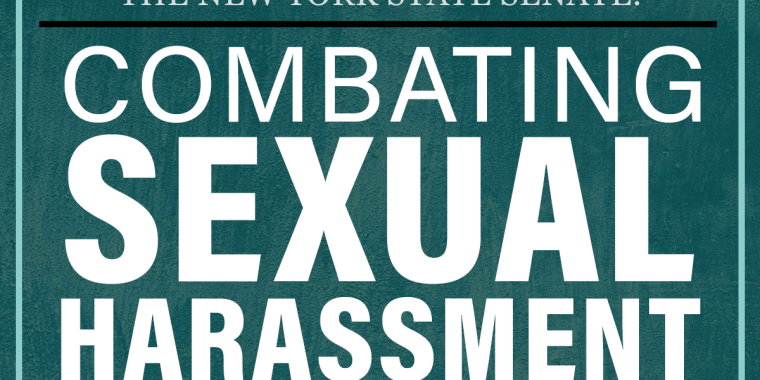
Senate Passes Comprehensive Strengthening of New York's Sexual Harassment Laws
March 13, 2018

Albany, NY -- The New York State Senate has passed legislation that is the most comprehensive response yet to sexual harassment in New York’s workplaces. The bill (S.7848A), sponsored by members of the Senate Republican Women’s Caucus, and others, would prevent individuals from engaging in misconduct that creates a hostile work environment in either the public or private sectors and encourages victims to come forward.
The major reforms passed today include: establishing a statutory definition of sexual harassment; prohibiting the anonymity of the accused in court-approved settlements and banning mandatory sexual harassment arbitration clauses; prohibiting confidentiality agreements unless the victim requests confidentiality; expanding protections to independent contractors; creating uniform policies for all branches of state and local government; and protecting hardworking taxpayers from paying for public sector harassment settlements.
Senator Kathy Marchione said, “Every woman in New York State deserves a workplace and world free from the pernicious threats of sexual harassment, intimidation, and coercion. With the passage of our comprehensive legislation, we will be another step closer to making this a reality. Once again, our Senate Republican Majority Conference is taking the lead by advancing a positive, purposeful and proactive policy that will help ensure all women have the opportunity to succeed and be free from the threat of sexual harassment.”
The Senate legislation would:
• Adopt the definition of “Sexual Harassment” into state law: Although the state Division of Human Rights has a definition it uses administratively, there is currently no definition in the statute of what constitutes sexual harassment. That leaves litigants subject to varying interpretations by judges, who may improperly dismiss sexual harassment cases at the outset. One study found that approximately 37 percent of cases are dismissed pretrial.
The bill creates a uniform definition of sexual harassment that is based on federal regulations: unwelcome sexual advances, requests for sexual favors, and other verbal or physical conduct of a sexual nature when submission to or rejection of such conduct, explicitly or implicitly, affects an individual's employment, unreasonably interferes with an individual's work performance or creates an intimidating, hostile or offensive work environment without regard to actual economic injury to or discharge of the individual.
• Prohibit secret settlements unless the victim requests confidentiality: Courts would be prohibited from accepting any sexual harassment settlements that include confidentiality agreements or provisions. This would help ensure that those responsible are held accountable and prevent future harassment.
• Prohibit mandatory arbitration for sexual harassment complaints: Mandatory arbitration clauses are often used by employers to force sexual harassment victims into private arbitration proceedings, which precludes their ability to seek legal action.
• Protect non-employees in the workplace: Currently, individuals who are not employees but are present in the workplace on a contract basis cannot file complaints against their harassers. The legislation would close this loophole by extending to contract workers the same right to file sexual harassment complaints to the state Division of Human Rights as individuals who are directly employed by the company or entity.
• Create a uniform policy for all branches of state and local government: The state Department of Labor would be required to create a strong model management policy defining and prohibiting sexual harassment. Every county, city, town, village, school district, or other public entity would be required to develop a sexual harassment prevention policy that applies to all employees and which includes investigation procedures and a standard complaint form. Each complaint would be confidential and the policy must include the prevention of intimidation, retaliation, or coercion to help protect the complainant.
The measure also standardizes the process for state government. The legislature would be required to designate an independent attorney specializing in employment law to investigate complaints based on sexual harassment. A specialized unit within the state’s Joint Commission on Public Ethics would also be established to receive and investigate complaints. Managers and supervisors would be required to report as soon as they become aware of sexual harassment conduct.
• Protect taxpayer funds from being used for individual sexual harassment settlements: When there is a finding or admission of sexual harassment by a state or local employee, this measure holds the harasser financially accountable for the settlement by enabling the public entity to recoup taxpayer money.
The bill will be sent to the Assembly.
related legislation
Share this Article or Press Release
Newsroom
Go to Newsroom
National Prescription Drug Take Back Day
April 28, 2016

RecruitNY Weekend: April 23 & April 24
April 21, 2016
